
Milorad Dodik
SARAJEVO: Nationalist Milorad Dodik took the lead in a vote for the Serb seat of Bosnia’s tripartite presidency, as a country splintered along ethnic lines awaits the final results.
The elevation of the hardliner to the top office – a joint post he will share with Muslim and Croat leaders – lays bare the nationalism haunting Bosnia more than two decades after it was torn apart by war. Dodik is the longtime leader of Bosnia’s Serb-majority Republika Srpska, one of the country’s post-war entities.
He has previously threatened to hold a vote on the region’s secession – a move that would unravel a delicate arrangement that has kept peace since the 1992-95 conflict. Now the firebrand will co-lead a country he has referred to as a ‘failed concept’.
“This victory is as clean as a whistle,” Dodik announced from his base in Banja Luka, the capital of the Serb-run entity. He said he captured 56 per cent of the vote, beating his moderate rival Mladen Ivanic with 85 per cent of the ballots counted.
The electoral commission confirmed Dodik’s lead, announcing after midnight that he had 55.15 per cent of the vote after input from 43 per cent of polling stations. Full results was announced yesterday. But the incumbent Ivanic claimed the race could not yet be called.
“We will wait for the report of our observers to see if everything has gone well,” he said in a televised statement.
Meanwhile, the main Bosnian Muslim party SDA claimed a victory for its candidate Sefik Dzaferovic in the three-person presidency. And the Croat post went to Social Democrat Zeljko Komsic, knocking out current president Dragan Covic from the nationalist right.
Bosnia’s complex – and some say dysfunctional – political system is a relic of the 1990s war that saw Serbs, Croats and Muslims turn on each other in brutal fashion.
The conflict left 100,000 dead, displaced millions and wrecked the economy and infrastructure. The peace accord that stopped the fighting sliced the country in two halves – one dominated by Serbs and the other home to Muslims and a Croat minority.
Each ‘entity’ has its own government with a high level of autonomy. They are held together by a relatively weak national administration, headed by the tripartite presidency which rotates between members every eight months. — AFP
